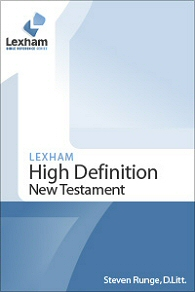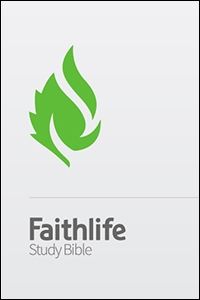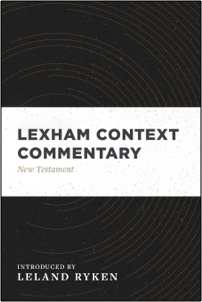The New Testament writers used a variety of literary and grammatical devices to help guide the reader. Some of these devices were intended to attract attention to important information, while others served to push less-important information into the background. Some were used simply to grab your attention, alerting you that something important or surprising was about to happen.
14 But Peter said, “By no means, Lord; for I have never eaten anything that is common or unclean.”
15 And the voice came to him again a second time, “What God has made clean, do not call common.”
16 This happened three times, and the thing was taken up at once to heaven.
17 Now while Peter was inwardly perplexed as to what the vision that he had seen might mean, behold, the men who were sent by Cornelius, having made inquiry for Simon’s house, stood at the gate
18 and called out to ask whether Simon who was called Peter was lodging there.
19 And while Peter was pondering the vision, the Spirit said to him, “Behold, three men are looking for you.
Runge, S. E. (2008–2014). The Lexham High Definition New Testament: ESV Edition (Ac 10:17–19). Lexham Press.
Faithlife Study Bible (FSB) is your guide to the ancient world of the Old and New Testaments, with study notes and articles that draw from a wide range of academic research. FSB helps you learn how to think about interpretation methods and issues so that you can gain a deeper understanding of the text.
10:9–24 God gives Peter a vision that prepares him for the arrival of the messengers from Cornelius (vv. 7–8). The vision’s meaning and ot allusions reinforce the universal cultural scope of the Church’s message and mission.
10:14 common and unclean Some of the creatures the Lord tells Peter to eat would have been forbidden for a Jew to eat, and others would have been acceptable
Peter’s strong reaction against God’s command likely stemmed from the fact that he would have considered even the otherwise clean animals to be contaminated by being mingled with the unclean, on the basis of ot law (see Lev 11).
10:15 made clean Compare Acts 15:9.
10:16 three times Just as Peter had denied Jesus three times (Luke 22:34), here he refuses to obey three times.
10:19 the Spirit The Spirit helps Peter to understand the vision by acting on it instead of merely continuing to contemplate it.
Barry, J. D., Mangum, D., Brown, D. R., Heiser, M. S., Custis, M., Ritzema, E., Whitehead, M. M., Grigoni, M. R., & Bomar, D. (2012, 2016). Faithlife Study Bible (Ac 10:19). Lexham Press.
The Lexham Context Commentary: New Testament surveys each book of the New Testament at several levels—Book, Division, Section, Pericope, Paragraph, and Unit—providing contextually appropriate commentary on each level. The reader of the commentary can easily ascertain the contextual importance of any larger section, or pericope, or even a particular verse of Scripture.
Peter’s Vision (10:9–16)
This paragraph describes Peter’s strange vision about unclean animals, descending from heaven in a sheet-like object, that Peter is commanded to eat (10:9–13). When he refuses two commands, God responds with a mysterious saying about how what is created clean cannot be called profane (10:14–16).
10:14 This verse is Peter’s response to the voice in his dream that commands him to kill and eat the animals lowered to the ground in the sheet (10:12–13): Peter unequivocally refuses to obey the instructions from the voice in his dream on the grounds that he has never consumed flesh that is considered unclean or profane; he is not about to start now.
10:15 This verse is a second command from the voice in Peter’s dream (10:13–14): this second command from the voice is a rebuttal of Peter’s refusal to obey the voice’s first directive that Peter kill and eat the flesh in the blanket. Peter must not call profane that which God has created as clean.
10:16 This verse states the number of times that the voice commands Peter in his dream to eat and kill the flesh in the blanket (10:12–15): before the blanket is lifted from the ground and taken back into heaven, the voice speaks to Peter three times. Conversely, in Cornelius’ vision, the divine messenger spoke to him once, and Cornelius obeys (10:3–8).
Summoned to Caesarea (10:17–23)
Peter is still baffled about his strange dream, and the Spirit directs Peter’s attention to the three men from Cornelius searching for him (10:17–19). The Spirit instructs Peter to accompany the men because the Spirit has sent them (10:20–21). The three men explain their mission to Peter, including that a holy angel directed Cornelius to invite Peter to his house to speak; Peter invites the messengers to lodge with him before they leave the next day (10:22–23).
10:17 Luke describes Peter’s state of mind and the arrival of Cornelius’ delegation after his dream (10:10–16). While a deeply confounded Peter ruminates over the vision in his dream, Cornelius’ three-man delegation arrives at the gate to Simon’s house and inquires about Peter.
10:18 This verse is the explicit question that Cornelius’ delegation asks (10:18) as they stand at the gate of the local tanner Simon’s house (10:17). They ask whether Simon Peter is staying at that particular house.
10:19 the Spirit informs Peter, while he is still puzzling over the dream, that three men are searching for him. The Spirit alerts Peter to the presence of Cornelius’ men before anyone can notify Peter that the men are at Simon’s gate inquiring about him (10:18).
Mangum, D., ed. (2020). Lexham Context Commentary: New Testament (Ac 10:9–16). Lexham Press.


